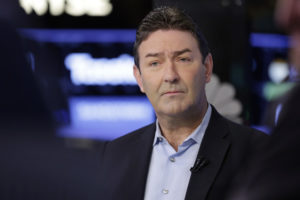A Delaware Court on Wednesday dismissed a shareholder lawsuit filed against McDonald’s Corp. and its board of directors, finding the plaintiffs did not show that the directors ignored red flags that demonstrated widespread sexual harassment was taking place.
Court of Chancery Vice Chancellor J. Travis Laster noted in his opinion that the board fired Chief Executive Officer Steve Easterbrook and human resources director David Fairhurst after complaints were filed against them. The fact that more sexual harassment complaints were filed later does not give investors a cause of action, he said.
“Whether the response fixed the problem is not the test,” Laster wrote. “Fiduciaries cannot guarantee success, particularly in fixing a sadly recurring issue like sexual harassment. What they have to do is make a good faith effort.”
Laster’s opinion says McDonald’s began to resemble a boy’s club after the board hired Easterbrook as CEO in 2015. Easterbrook brought Fairhurst with him to the corporate headquarters in Chicago, appointing him as global chief people officer. The two men had became friends while working together at McDonald’s London office.
They allegedly flirted with female employees, encouraged recruiters to hire “young, pretty” women and drank alcohol at company events. Executives gathered weekly for happy hours at an “open bar” on the eighth floor of the Chicago office.
The party soon came to an end.

In 2016, more than a dozen employees from restaurants across the country filed sexual harassment complaints with the Equal Employment Opportunities Commission. More sexual harassment complaints were filed in 2018. In September of that year, workers in 10 cities organized a one-day strike to protest sexual harassment. U.S. Sen. Tammy Duckworth, (D-Illinois), demanded answers from the company.
The board disciplined Fairhurst after 30 company employees witnessed him pull a female employee onto his lap during an event for human resources staff. But the board didn’t fire Fairhurst, despite a “zero-tolerance” sexual harassment policy.
In late 2019, the board learned that Easterbrook was having a prohibited relationship with an employee. The board decided to terminate Easterbrook without cause and granted him a severance package worth $125.8 million. The board also fired Fairhurst for cause, but did not disclose the reason.
A coalition of union pension funds that owned stock in the company protested the decision to fire Easterbrook without cause and eventually filed a class action lawsuit. Activists investors tried to block the re-election of several board members.
In July 2020, the board learned that Easterbrook had a sexual relationship with another employee, in addition to the relationship that led to his termination. An investigation revealed a third sexual relationship, and the fact that Easterbook had used his company email account to transmit nude photographs of himself and his lovers.
McDonald’s sued to recover its severance payments. Easterbrook settled the case by agreeing to forfeit cash and stock worth $105 million.
Two local Teamsters unions that owned McDonald’s stocks filed a derivative lawsuit in 2020. They alleged that the company’s decision to first hire Easterbrook without cause demonstrated bad faith and wasted corporate resources. The suit says the directors ignored red flags that pointed to a corporate culture that condoned sexual harassment.
Laster’s opinion says there certainly were red flags, but the record shows that the board of directors responded to them. The company updated an anti-harassment policy, hired consultants to advise it and design new training programs, established a hot line for employees at franchise restaurants and rescinded a policy that required arbitration of harassment and discrimination complaints.
“Because of the effort they made, it is not possible to infer that the director defendants acted in bad faith,” the opinion says.

Gail Weinstein, a lawyer with Fried, Frank, Harris, Shriver & Jacobson in New York who advises on corporate governance, said directors & officers insurers may rest easier after the ruling, but there is also cause for concern.
“While people can argue about whether they did enough or made good decisions, the fact that they acted means the court can’t reasonably infer that they ignored their oversight duties in bad faith,” she said. “Their response, once they knew, wasn’t so far off the mark as to suggest bad faith.”
On the other hand, Laster’s decision says that a board’s oversight duties do not apply only to “mission critical” risks, “as some have thought.”
Also, the opinion says that sexual harassment and worker safety in general are mission-critical risks. She said some attorneys have argued that these are employment issues, not fiduciary obligations that give rise to liability to the corporation.
“So that is an issue insurers are likely now to focus on,” Weinstein said.
Ron Olson, an attorney with Ross, Aronstam & Moritz who represented McDonald’s and its directors, applauded the ruling.
“The court rightly dismissed the case based on what happened here: under the board’s leadership, the company immediately investigated when it learned the scope of Easterbrook’s misconduct in 2020, upholding the company’s values and recovering equity awards and cash that was worth $105 million at the time,” Olson said in an email. “The record shows that the board actively enforced the company’s policies and commitment to maintaining safe, respectful, and inclusive workplaces.”
Was this article valuable?
Here are more articles you may enjoy.

 When the Workplace Is Everywhere: The New Reality of Workers’ Comp Claims
When the Workplace Is Everywhere: The New Reality of Workers’ Comp Claims  Moody’s: LA Wildfires, US Catastrophes Drove Bulk of Global Insured Losses in 2025
Moody’s: LA Wildfires, US Catastrophes Drove Bulk of Global Insured Losses in 2025  Walmart to Pay $100 Million to Settle FTC Case on Driver Wages
Walmart to Pay $100 Million to Settle FTC Case on Driver Wages  UK Floods Raise Specter of ‘Mortgage Prisoners’ Across Banks
UK Floods Raise Specter of ‘Mortgage Prisoners’ Across Banks 